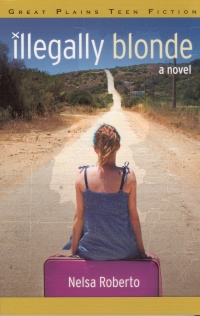| ________________
CM . . . . Volume XVII Number 2. . . .September 10, 2010. 
 |
Illegally Blonde.
Nelsa Roberto.
Winnipeg, MB: Great Plains, 2010.
227 pp., pbk., $14.95.
ISBN 978-1-894283-97-7.
Grades 8-11 / Ages 13-16.
Review by Joan Marshall.
***/4
|
| |
|

excerpt:
“You know Filipe Delgado used to date Marta, don’t you?”
“What?”
I slam-stopped in the middle of the road. Carlos no longer had a scowl on his face. He was, instead, watching me with a mild, almost bland, look on his face.
“Oh, yes. You didn’t know that? Marta used to be fun too, she used to help me with my homework. Even play soccer.”
I tried to picture the aloof Marta running around after her little brother with a soccer ball. But I couldn’t do it.
Carlos kicked a small stone with enough force to send it flying down the road until it disappeared in a hazy shimmer of heat and dust. His eyes narrowed. “But then she started seeing Filipe. And she changed. She had no more time. Except for him.”
He looked up at me then. Like he was waiting to see how I’d react to his quiet, matter-of-fact statement.
I cleared my throat. “So why’d they break up?” I tried to sound bored, indifferent as to whether Carlos answered me or not. Like I was just passing the time during a long, hot and dusty walk home. Teacher. Ha. I should be an actress.
Carlos picked up a gnarled stick and dragged it along the low stone wall that bordered the road. The ‘rat-a-tat-tat’ noise of the stick against stone was more annoying than silence but Carlos finally got around to answering my question, which saved me from having to kill him.
Like many 17-year-old graduating students, Lucy do Amaral is totally focused on the prom, her boyfriend Joel and her graduation from high school. So when she finds out that her Portuguese family entered Canada illegally 15 years ago and is to be deported in a week, she is overwhelmed with grief and anger. Even after arriving at her aunt and uncle’s modest home in a village hours from Lisbon, Lucy can only concentrate on how she will get back to Canada and her beloved boyfriend. She meets Tomas, a cool character who promises her an illegal Canadian passport if she can find the money he demands. Then the school recommends her as an English tutor to Filipe Delgado, a handsome young man who runs a tutoring business and whose mother is the local wealthy landowner of several olive groves. Although Lucy makes many stupid mistakes, she gradually realizes that she loves Filipe and the beautiful Portuguese landscape. Even though the grateful father of one of her students is a lawyer who begins to work on her family’s case to ensure their return to Canada, Lucy realizes that she will return to Portugal some day and Filipe will be there waiting for her.
Although there are moments when Lucy’s self-centred, self-delusional behaviour seems wilful and immature for a student of her age, her sharp wit and agile ability to make each new twist in her family’s situation work for her own self-interest will attract the intended reader. Most impressive is her gradual realization that she enjoys teaching children and would make a great teacher.
Lucy’s anxious, distraught parents, her steady, committed older brother Pedro and the smooth-talking crook Tomas are particularly vivid secondary characters. Even the younger boys, her cousin Carlos and the macho Luis bring a smile to the story. Filipe manages to be a combination of hot movie star, serious student and responsible land owner that is somewhat unrealistic in one so young. His mother’s deterioration and mental imbalance also seems a bit far-fetched even as it provides drama to the plot.
The dialogue and Lucy’s interior self-talk is absolutely excellent. Because Roberto has captured perfectly the vocabulary, tone and emotions of the characters, the story flies by with the reader eagerly turning pages. From the rigid upper middle class kitchen of Joel’s parents to the cramped home of Lucy’s loving relatives, the settings not only reflect the characters’ values but also evoke a palpable love of Portuguese culture. Exceptional descriptions of the land and village in Portugal are woven seamlessly into the plot.
The themes of controlling one’s impulsivity and supporting one’s family ahead of one’s immediate desires will not be lost on the intended reader.
Recommended.
Joan Marshall is a Winnipeg, MB, bookseller.

To comment on this title or this review, send mail to
cm@umanitoba.ca.
Copyright © the Manitoba Library Association. Reproduction for personal use is permitted only if this copyright notice is maintained. Any other reproduction is prohibited without permission.
NEXT REVIEW |
TABLE OF CONTENTS FOR THIS ISSUE- September 10, 2010.
AUTHORS |
TITLES |
MEDIA REVIEWS |
PROFILES |
BACK ISSUES |
SEARCH |
CMARCHIVE |
HOME |
